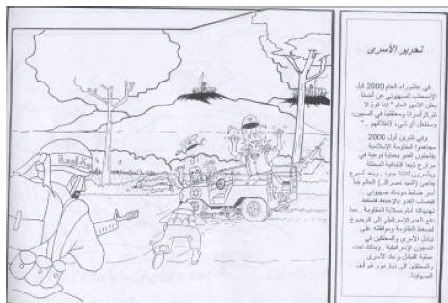Attention on the Palestinian Authority currently centres around speculation as to whether some sort of coalition government will be formed between Fatah and Hamas, in order to create a pretense at moderation. Western leaders can't seem to wait to be able to send more of their taxpayers' cash to support the institutionalised Palestinian corruption and violence that has been cultivated over the last decade.
Meanwhile, the IDF is focused on more practical activities. Press releases that don't get much play tell of weapons cashes and weapons smuggling tunnels uncovered almost daily - usually hidden in civilian structures and areas. Katyusha rockets continue to fall on southern Israel - although IDF action has slowed the pace and make it more difficult for Israeli population centres to be hit.
Documents recently captured by the IDF show Palestinian charities are centres of propaganda for war and anti-Semitic hatred disseminated in schools and throughout Palestinian society. Palestinian Media Watch reports that, as was the case under the Fatah regime, PA funded television is once again regularly broadcasting propaganda videos encouraging Palestinian men and women to "martyr" themselves in terror attacks against Israelis. The hope that a Palestinian unity government (whether or not funded with western money) will somehow magically create serious advances toward peace seems just a little misplaced.
And as for international aid having the effect of relieving poverty, other IDF releases are telling.
The IDF has confiscated around $1.3m in cash destined for terrorist activities. The IDF put it nicely "...the Palestinian Authority has no system of supervision over moneychangers, and they are therefore free to make such transfers without any fear of sanctions or limitations." Translated? A totally uncontrolled black market allows money to freely flush through. Of course, this in itself is an indicator that at least part of the economic distress of the Palestinian Authority is due to a deliberate decision not to control or collect taxes from large segments of that society. [I wrote about the PA's lack of tax enforcement in the The Frankfurter Plan.] Flushing more money into an uncontrolled system is hardly a path to economic responsibility.
Of course, another prime economic complaint of the Palestinians is their inability to rely on trade or border crossings with Israel. While this no doubt creates economic stress, another IDF press release illustrates exactly where the blame lies. With a long history of border crossings being used as corridors for the passage of equipment and people on their way to commit terrorist attacks, one can understand heightened security procedures. If in the middle of the Israeli city of Ra'anana I have my car searched and a metal detector passed over my body every time I want to enter the local shopping mall - then one might expect slightly higher security at any border crossing. In this Palestinian created reality, indignity at delays at a border crossing with a sworn enemy is a little laughable. But to complain of closures when these critical border crossings are the very target of Hamas government sponsored terrorists? I suggest a more appropriate reaction would be gratitude for the humanity of operating a border crossing at all!
It is unusual for the IDF to release information about foiled terrorist attacks, and as the press release is not available on-line, I will attach it here.


